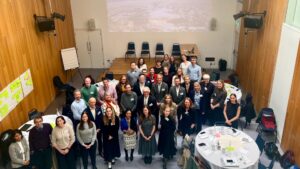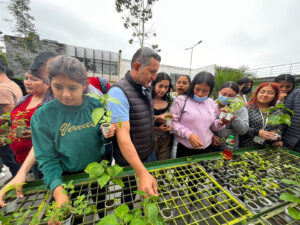
Millions of dollars are spent on public services such as education, health care, and infrastructure each year. Citizens have a right to know how their governments are collecting money, and they should have a say on how those funds are being spent. Opening up fiscal and spending processes can be both a powerful tool for planning and risk mitigation, as well as an important safeguard to prevent corruption. Given the added financial hardships caused by the COVID-19 pandemic, public oversight of government spending, including record-breaking stimulus packages in many countries, is more essential than ever before.
Fiscal openness—which encompasses transparency, public participation, and legislative oversight throughout the budget and fiscal cycle—delivers greater value for money and reduces the cost of borrowing. Participatory budgeting, especially, can improve the efficiency of public service delivery and strengthen tax compliance. Publicly-available spending audits can help lead to better electoral outcomes for elected officials that have clean audits.
Over the past decade, OGP members have used their action plans to increase participation in budgeting (specifically by women and marginalized groups), ensure that fiscal information is published in accessible language, and more recently to publish COVID-19 emergency funds. Open spending is a foundational policy reform for any anti-corruption and Open Response, Recovery, Renewal efforts.
According to OGP’s Independent Reporting Mechanism (IRM), which tracks progress of members, fiscal openness commitments tend to have much higher ambition and stronger early results than the average OGP commitment. Additionally, the latest OGP Vital Signs research shows that advancing open budgets through OGP action plans is positively associated with improved “real-world” performance. Specifically, OGP countries that have made commitments related to open budgets—ambitious commitments across multiple action plans, especially—have become more open than other countries according to third-party assessments.
The scale of progress and reform that has taken place over the last decade would not be possible without partner organizations. Partners provide timely, consistent technical assistance, advocacy support, and measurement expertise, and importantly, also play a role at the domestic level with the co-creation and implementation of fiscal openness reforms.


Time to Focus: 10 Years of IRM Recommendations
After 10 years, the IRM is adapting the target and timing of recommendations. Let’s look at how IRM recommendations have evolved over time, what to expect from...

Fiscal Openness Fact Sheet 2023
Citizens deserve to know and have a voice in how their government is getting money, what is being prioritized for spending, and whether the money is being used effectively. Given the added financial hardships caused by the COVID-19 pandemic, public oversight of government spending is more essential than ever before...
Oversight and Accountability
- Move beyond transparency of budget planning and approval to disclose data on budget execution, performance, and oversight. Consider disclosing data on revenue projections, tax expenditures, and equity of spending.
- Create independent and legislative public oversight mechanisms to ensure COVID-19 emergency funds are spent effectively and equitably. Ensure that the public can support audit institutions in their work. Indonesia has committed to improving transparency around COVID-19 related budgets at the local and national levels by allowing the public to monitor and provide feedback through a budget transparency application.
Civic Participation
- Increase citizen participation and monitoring throughout the budget cycle, including planning, execution, and oversight. Ghana’s government and civil society organizations collaborated to create a participatory budget that more directly reflected citizens’ wants and needs.
- Apply open and participatory budgeting to specific sectors such as education and health care. Madrid implemented participatory budgeting allowing the public to decide the allocation of 100 million Euros in their choice of projects.
Inclusivity
- Include gender-responsive budget reviews to ensure that public resources are allocated in ways that promote gender-equitable spending and represent the interests of all citizens. Côte d’Ivoire engaged women’s groups in participatory budgeting to help set priorities and fund public services that better respond to their needs.
- Collaborative Africa Budget Reform Initiative
- Global Initiative for Fiscal Transparency (GIFT)
- Global Movement for Budget Transparency, Accountability, and Participation (BTAP)
- International Budget Partnership (IBP)
- International Monetary Fund (IMF)
- Organization for Economic Cooperation and Development (OECD) – View our MoU here.
- People Powered
- Programme D’appui Aux Gouvernements Ouverts Francophones (PAGOF)
- Public Expenditure and Financial Accountability Program
Resources
-
GIFT’s Online Course on Advancing Fiscal Transparency for Development
The Advancing Fiscal Transparency for Development course is offered by the Global Initiative for Fiscal Transparency (GIFT) is designed to…
2024, Outbound Link, Web Page
-
Fiscal Openness Fact Sheet 2023
Citizens deserve to know and have a voice in how their government is getting money, what is being prioritized for…
2023, Document, PDF
-
GIFT's Guide on Advancing Fiscal Transparency for Development
Following the success of the Advancing Fiscal Transparency for Development online course, funded by the U.S. Department of State, this…
2023, Outbound Link, Web Page
-
Participatory Budgeting via National Law: What Works and What Doesn’t
National PB laws appear to be most effective when lawmakers and civil society groups are committed to their long-term success…
2021, Outbound Link, Web Page
-
Fiscal Openness Fact Sheet
A look at global progress and member-level examples of fiscal openness work in OGP
2021, Document, PDF
-
International Budget Partnership: COVID-19 Report
The International Budget Partnership shares why accountability is crucial in COVID-19 fiscal responses.
2021, Outbound Link, Web Page
-
Open Response + Open Recovery: Strengthening Transparency and Accountability in Budgeting and Contracting
As part of the Open Response + Open Recovery Digital Forum, OGP, Open Contracting Partnership, and International Budget Partnership hosted a…
2020, , Web Page
-
A Guide to Open Government and the Coronavirus: Fiscal Openness
The COVID-19 pandemic has weakened economies, increased public debt, and exacerbated existing inequalities. Governments across the world are in the…
2020, Guidance Document, Web Page
-
What Steps to Increase Fiscal Transparency and Participation Should OGP Countries Take in Their Next Action Plans?
2017, Perspective, Web Page
-
The Impacts of Fiscal Openness: A Review of the Evidence
Fiscal transparency and participation in budgeting are widely promoted and enshrined in an increasing number of international standards and norms.…
2015, Outbound Link, Web Page
Recent Content
Fiscal Openness in Nordic+ Fact Sheet (June 2024)
Fiscal transparency has been an area of great achievement for members of the Open Government Partnership (OGP), including the Nordic+ region...

Four Steps Towards Fiscal Openness
The OGP Nordic+ group met in April 2024 and again during Open Gov Week to discuss how to advance fiscal transparency and enhance participation in fiscal policy. From these discussions, four key lessons emerged, each illustrated with practical examples from various countries.

Countering Kleptocracy through Open Government and Democratic Oversight
Kleptocracy, "rule by thieves," distorts state institutions for elite gain, harming source and host countries. Explore a two part series by The National Democratic Institute and OGP that offer actionable strategies for OGP members and local governments to combat transnational kleptocracy, safeguarding governance, economies, and national security.
State of the Evidence: Debt Transparency
How can countries better manage existing and future debt challenges? This report assesses the empirical evidence on the consequences of debt transparency to understand its potential use as a tool to combat continued challenges to debt sustainability.

Supporting Local Initiatives to Deliver Better Service
Read how the 2021 OGP Local Accelerator Awards, supported civil society organizations and local governments in collaboration to carry out reforms and deliver public services.
